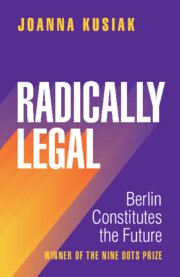Before the law, there stands a guard.
It’s all about the right mix – even if it means letting in the odd lawyer in a double-breasted suit with his Gucci-Prada wife.
Before the law, there stands a guard.1 We arrive in front of him, a small group from the big city. We seek admittance to the law. But the guard says he cannot admit us just now.
‘We can come again,’ we say. ‘When is it possible to enter?’
‘It might be possible to enter, but not now. And not later. Come earlier,’ he snickers, ‘years earlier than now. Then it might be possible.’
But the gate to the law stands open, as it always does. When the guard steps aside, we stoop to get a view of the inside. The guard notices us doing this.
‘If you’re so tempted, why don’t you try and get in in spite of me,’ he laughs. ‘But remember: I am mighty. And I am just the lowest of all the guards. From room to room there are guards, each more powerful than the one before. I cannot endure even one glimpse of the third!’
We know that the law should be accessible to everyone, always. But we anticipated such difficulties. We have lived long enough in the big city; we have seen those mighty guards. We have waited tables at their incessantly growing galas. Some drank whisky on the black rocks while others, dressed all in red, decreed austerity of the imagination.
We look again at the guard in front of us. His suit is made of price tags; his pockets are sewn shut. We have no time to lose. We will not rush. We will not leave now.
The guard points us to a bench where we can sit down beside the door. There we wait, and wait. We wait for days and years. And we wait joyfully.
Before the law, we build a camp. We decorate the law’s gates with flags and ribbons, lush yellow and pansy purple. In the evenings, we dance around the fire and sing songs about the Constitution. We write love letters to the law and raise them above the city squares (Figure 7.1).

Figure 7.1 Dancing before the law
We count ourselves, as we count on ourselves, as we count on the law. We write our names on countless scraps of paper. Every day, we count them too. By the time the conkers fall and line the city’s wide boulevards, we are 1 million.
Journalists arrive to conduct little interrogations, quizzing us about our homes and much else besides. They question the guard about our prospects of admittance. As the guard hesitates, professors arrive from faraway towns. The professors gasp, and grunt, and roar, and whimper. They wipe the sweat off their shiny foreheads. And they say the same thing, again and again. That the law should be accessible to everyone, always.
As we trouble the guard with our endless enquiries, things start to appear in front of the gate. They are gifts, and threats, and pleas, and promises, all wrapped in sheets of shiny language.
‘Take it and go,’ the guard says. ‘The law will never give you anything better.’ We take it and stay. ‘The only reason we are accepting this,’ we say, ‘is so you don’t think there’s something you’ve failed to do to make us go.’
Over many years, we observe the doorkeeper almost continuously. He curses us, loudly and recklessly in the early years, then later, as he gets old, merely chuntering under his breath. He becomes a little childish. By now he has made friends with the fleas in his fur collar, and he asks the fleas to help him make us go.
Over time, his eyesight begins to fail. He is unsure whether things around him are getting dark, or whether his eyes are deceiving him. B. brings him a folding chair and K. covers him with a warm blanket. M. pours him some hot tea from her thermos, and C. shares their sandwich with him. It is getting late. In the darkness, we all discern a glory that bursts unquenchably from the gates to the law.
The guard has not much longer to live. Before he retires, he assembles all the experiences of many years into one question, which he has never dared to ask us. He beckons us over, unable to haul his creaking body upright.
We bend over to hear him. The difference in our respective heights has shifted a lot to his disadvantage.
‘What is it you want to know?’ we ask the guard.
‘Many people give up on the law,’ he says, ‘but you are insatiable. How is it that over so many years you kept insisting on being admitted?’
We see that the man is nearing the end of his life. We pull out a dusty volume of the Grundgesetz and point to Article 15.
‘This door was intended for all of us,’ we say, in unison, to reach his failing ears. ‘Now we are going to open it!’


